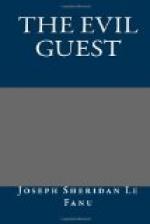Marston was not perfectly satisfied, though very nearly, with the evidence now in his possession. The letter, the stolen perusal of which had so agitated him that day, bore no signature; but, independently of the handwriting, which seemed, spite of the constraint of an attempted disguise, to be familiar to his eye, there existed, in the matter of the letter, short as it was, certain internal evidences, which, although not actually conclusive, raised, in conjunction with all the other circumstances, a powerful presumption in aid of his suspicions. He resolved, however, to sift the matter further, and to bide his time. Meanwhile his manner must indicate no trace of his dark surmises and bitter thoughts. Deception, in its two great branches, simulation and dissimulation, was easy to him. His habitual reserve and gloom would divest any accidental and momentary disclosure of his inward trouble of everything suspicious or unaccountable, which would have characterized such displays and eccentricities in another man.
His rapid and reckless ramble, a kind of physical vent for the paroxysm which had so agitated him throughout the greater part of the day, had soiled and disordered his dress, and thus had helped to give to his whole appearance a certain air of haggard wildness, which, in the privacy of his chamber, he hastened carefully and entirely to remove.
At supper, Marston was apparently in unusually good spirits. Sir Wynston and he chatted gaily and fluently upon many subjects, grave and gay. Among them the inexhaustible topic of popular superstition happened to turn up, and especially the subject of strange prophecies of the fates and fortunes of individuals, singularly fulfilled in the events of their afterlife.
“By-the-by, Dick, this is rather a nervous topic for me to discuss,” said Sir Wynston.
“How so?” asked his host.
“Why, don’t you remember?” urged the baronet.
“No, I don’t recollect what you allude to,” replied Marston, in all sincerity.
“Why, don’t you remember Eton?” pursued Sir Wynston.




